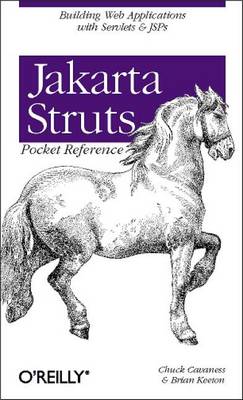Web tier frameworks have soared in popularity over the past year or so due to the increasing complexity of Java itself, and the need to get more work done with fewer resources. Developers who used to spend hours and hours writing low-level features can use a well-written framework to build the presentation tier so they start coding the "good stuff" sooner - the business logic at the core of the program. The Jakarta Struts Framework is one of the most popular presentation frameworks for building web applications with Java Servlet and JavaServer Pages (JSP) technologies. If you work with the Struts Framework, then you know it speeds development time. You also know that many of its features are made up of components that are used repeatedly. Having to stop to check each component's parameters and programming details can be a time waster. The answer? "The Jakarta Struts Pocket Reference". This portable book aims to provide easy access to the facts you need to get your job done.
It is a quick reference to all the core features of the Jakarta Struts framework and contains detailed information on the extensive Struts tag libraries, which were described in less detail in the larger work as they were still in development at that time. This little book also provides convenient coverage of the following: new features in Struts 1.1; configuration; action classes; action forms; built-in classes; using application modules; and internationalization.
- ISBN10 0596008341
- ISBN13 9780596008345
- Publish Date 29 May 2003
- Publish Status Active
- Imprint O'Reilly Media
- Format eBook
- Pages 120
- Language English
